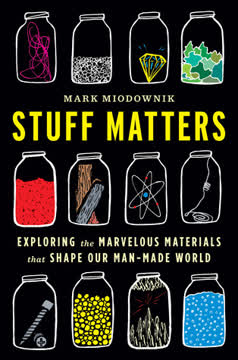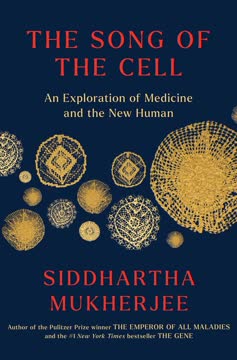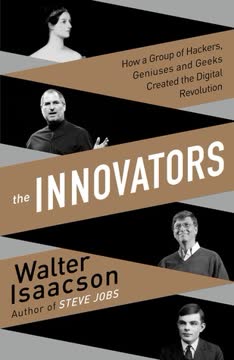Key Takeaways
1. CRISPR: Nature's Gene-Editing Tool Revolutionizes Science
CRISPR is a fabulous way that evolution has dealt with the problem of viral infection.
Nature's innovation. CRISPR (Clustered Regularly Interspaced Short Palindromic Repeats) is a bacterial defense mechanism against viruses, discovered through curiosity-driven research. This system uses RNA guides to direct enzymes like Cas9 to cut specific DNA sequences, allowing bacteria to remember and defend against viral invaders.
Revolutionary tool. Scientists adapted CRISPR into a powerful gene-editing tool, enabling precise modifications to DNA in various organisms, including humans. This breakthrough has wide-ranging applications:
- Medical research and potential cures for genetic diseases
- Agricultural improvements
- Biotechnology advancements
The discovery of CRISPR highlights the importance of basic scientific research in driving transformative innovations, often in unexpected ways.
2. Jennifer Doudna's Journey: From Curiosity to Nobel Prize
I was told more than a few times that girls don't do chemistry or girls don't do science. Fortunately, I ignored that.
Childhood curiosity. Jennifer Doudna's journey began with a fascination for nature's mysteries in Hawaii. Despite facing discouragement and feeling like an outsider, she pursued her passion for science, inspired by reading James Watson's "The Double Helix."
Scientific breakthroughs. Doudna's career highlights:
- Studied RNA structure and function
- Collaborated with Emmanuelle Charpentier to uncover CRISPR-Cas9's potential as a gene-editing tool
- Led efforts to adapt CRISPR for various applications, including COVID-19 detection and treatment
Her persistence and groundbreaking work culminated in winning the 2020 Nobel Prize in Chemistry, shared with Charpentier, marking a significant milestone for women in science.
3. The Race to Harness CRISPR for Human Gene Editing
We anticipate that human embryo genome editing will bring new hope to millions of families seeking healthy babies free from inherited or life-threatening diseases.
Global competition. The discovery of CRISPR's gene-editing potential sparked an intense race among scientists worldwide to apply the technology to human cells. Key players included:
- Jennifer Doudna's team at UC Berkeley
- Feng Zhang's group at the Broad Institute
- George Church's lab at Harvard
Rapid progress. Within months of Doudna and Charpentier's seminal 2012 paper, multiple teams demonstrated CRISPR's effectiveness in editing human cells. This led to:
- Patent disputes
- Ethical debates
- Formation of biotech companies to commercialize CRISPR technology
The competition drove rapid advancements but also raised concerns about the responsible use of this powerful tool in humans.
4. Ethical Dilemmas: Balancing Progress and Responsibility
The germline was no longer a red line.
Contentious issues. CRISPR's ability to edit human embryos raised profound ethical questions:
- Should we eliminate genetic diseases?
- Is it acceptable to enhance human traits?
- How do we ensure equitable access to gene-editing technologies?
Regulatory challenges. The scientific community and policymakers grappled with establishing guidelines for CRISPR use in humans. Key events:
- 2015 International Summit on Human Gene Editing
- He Jiankui's controversial creation of gene-edited babies in 2018
- Ongoing debates about the permissibility of germline editing
The ethical landscape continues to evolve, balancing the potential benefits of gene editing against the risks of unintended consequences and societal impacts.
5. CRISPR vs. COVID-19: A New Frontier in Viral Defense
We can learn from it in this pandemic.
Rapid response. When the COVID-19 pandemic struck, CRISPR researchers quickly pivoted to develop new tools:
- Diagnostic tests: DETECTR (Mammoth Biosciences) and SHERLOCK (Broad Institute)
- Potential treatments: PAC-MAN system to target and destroy the SARS-CoV-2 virus
Collaborative effort. The pandemic fostered unprecedented collaboration among scientists:
- Open sharing of research findings
- Cross-disciplinary teams tackling various aspects of the virus
- Accelerated development of CRISPR-based technologies
CRISPR's versatility in detecting and potentially treating viral infections showcased its importance beyond gene editing, highlighting its potential in addressing future pandemics.
6. The Future of Gene Editing: Cures, Enhancements, and Beyond
We now have the power to control our genetic future, which is awesome and terrifying.
Medical breakthroughs. CRISPR holds promise for treating various genetic diseases:
- Sickle cell anemia
- Huntington's disease
- Certain types of cancer
Ethical considerations. As gene-editing technology advances, society must grapple with complex questions:
- Should we allow enhancement of human traits?
- How do we ensure equitable access to gene-editing therapies?
- What are the long-term implications of altering the human genome?
The future of gene editing extends beyond medicine, potentially impacting agriculture, biotechnology, and even human evolution. Balancing the benefits and risks will require ongoing dialogue between scientists, ethicists, policymakers, and the public.
7. Collaboration and Competition: Driving Scientific Innovation
At the end of the day, the discoveries are what endure. We are just passing on this planet for a short time. We do our job, and then we leave and others pick up the work.
Competitive drive. The race to develop CRISPR technology showcased both the benefits and drawbacks of scientific competition:
- Accelerated progress and breakthroughs
- Patent disputes and fragmented research efforts
Collaborative spirit. The COVID-19 pandemic highlighted the power of scientific collaboration:
- Rapid sharing of research findings
- Cross-disciplinary teams tackling complex problems
- Open-access publishing of results
Future of science. The CRISPR story demonstrates the need for a balance between competition and collaboration in driving scientific innovation. Key lessons:
- Importance of curiosity-driven basic research
- Value of diverse perspectives and interdisciplinary approaches
- Need for open communication and data sharing
As science becomes increasingly complex and global, fostering a culture that encourages both healthy competition and meaningful collaboration will be crucial for addressing the world's most pressing challenges.
Last updated:
FAQ
What's The Code Breaker about?
- Focus on CRISPR Technology: The book delves into the revolutionary gene-editing technology CRISPR-Cas9, co-developed by Jennifer Doudna and Emmanuelle Charpentier, which allows precise DNA modifications.
- Jennifer Doudna's Journey: It chronicles Doudna's life from her childhood in Hawaii to her scientific achievements, highlighting her struggles, triumphs, and the ethical implications of her work.
- Scientific Collaboration and Competition: The narrative explores the dynamics of collaboration and competition among scientists like Doudna, Charpentier, and Feng Zhang, shaping the field of genetic engineering.
Why should I read The Code Breaker?
- Insight into Modern Science: The book offers a fascinating look at how modern science operates, emphasizing curiosity-driven research and the collaborative nature of discoveries.
- Ethical Considerations: It raises important ethical questions about gene editing and the potential consequences of manipulating human DNA, making it thought-provoking for biotechnology enthusiasts.
- Inspiring Story: Doudna's journey serves as an inspiration for aspiring scientists, particularly women in STEM, illustrating resilience and determination.
What are the key takeaways of The Code Breaker?
- Importance of Curiosity: Curiosity-driven research is essential for breakthroughs, as seen in Doudna's early fascination with nature leading to her career in biochemistry.
- Collaboration vs. Competition: The book highlights the balance between collaboration and competition in science, showcasing how teamwork can lead to significant advancements.
- Potential of CRISPR: CRISPR technology's transformative potential in medicine is discussed, including its ability to cure genetic diseases and the associated ethical dilemmas.
What are the best quotes from The Code Breaker and what do they mean?
- “I have always loved mystery stories.”: Reflects Doudna's fascination with uncovering nature's secrets, underscoring science as a quest to solve life's mysteries.
- “We have created a toolbox for future Frankensteins.”: Highlights ethical concerns about gene editing's potential misuse and the responsibility accompanying such power.
- “The fire that stokes the engine.”: Refers to competition in science as a motivating force, emphasizing that healthy competition can drive innovation.
How did Jennifer Doudna contribute to CRISPR technology?
- Pioneering Research: Doudna, with Charpentier, discovered the CRISPR-Cas9 system, laying the foundation for its use as a gene-editing tool.
- Nobel Prize Winner: In 2020, Doudna received the Nobel Prize in Chemistry for her contributions, underscoring the significance of her work.
- Advocacy for Ethical Use: Doudna actively participates in discussions about the responsible use of CRISPR technology, emphasizing ethical considerations.
What challenges did Doudna face in her career?
- Early Isolation: Growing up in Hawaii, Doudna felt like an outsider, shaping her resilience and determination in a male-dominated field.
- Navigating Competition: She faced intense competition from scientists like Feng Zhang, adding pressure to her work and relationships.
- Ethical Dilemmas: As CRISPR advanced, Doudna grappled with ethical implications, concerned about potential misuse and societal impact.
How does CRISPR-Cas9 work?
- Gene Editing Mechanism: CRISPR-Cas9 uses a guide RNA to direct the Cas9 enzyme to a specific DNA sequence, making a double-strand break for edits.
- Repair Processes: After the DNA is cut, the cell repairs the break, either by stitching ends together or using a template for accurate repair.
- Programmable Nature: The ability to modify the guide RNA makes CRISPR-Cas9 versatile for targeting different genes, setting it apart from previous technologies.
What ethical concerns are raised in The Code Breaker?
- Germline Editing Risks: Discusses implications of editing genes passed to future generations, raising questions about long-term effects on evolution.
- Access and Inequality: Highlights potential for CRISPR to widen healthcare inequalities if only the wealthy can afford gene editing.
- Potential for Misuse: Concerns about CRISPR's use for unethical purposes, like "designer babies," emphasize the need for regulations and guidelines.
How did Doudna's background influence her work?
- Curiosity-Driven Childhood: Her early fascination with nature in Hawaii fueled her desire to understand biological processes.
- Supportive Family: Encouragement from her family, especially her father, helped her overcome educational and career challenges.
- Resilience from Isolation: Feeling like an outsider taught Doudna resilience, essential as she navigated the competitive world of science.
What impact has CRISPR technology had on medicine?
- Potential to Cure Diseases: CRISPR-Cas9 promises to cure genetic disorders by editing faulty genes, revolutionizing treatment for conditions like sickle cell anemia.
- Advancements in Research: The technology accelerates genetics research, opening new avenues for understanding complex diseases.
- Ethical and Regulatory Discussions: CRISPR has sparked important conversations about gene editing ethics, crucial for responsible and equitable use.
What is the future of CRISPR technology?
- Expanding Applications: CRISPR is expected to expand beyond human gene editing to agriculture, environmental science, and biotechnology.
- Ongoing Research and Development: Scientists continue exploring CRISPR's potential, improving precision and efficiency for new techniques and applications.
- Ethical Frameworks: Establishing guidelines and regulations will be essential to ensure gene editing benefits are accessible and risks managed responsibly.
What role does public perception play in the future of CRISPR?
- Influencing Regulations: Public perception can impact the regulatory landscape, shaping policies that govern gene editing use.
- Ethical Discourse: Engaging the public in discussions about gene editing ethics ensures diverse perspectives in decision-making.
- Education and Awareness: Increasing public understanding of CRISPR's benefits and risks empowers participation in biotechnology conversations.
Review Summary
Readers generally found The Code Breaker informative and engaging, praising its exploration of CRISPR technology and Jennifer Doudna's scientific journey. Many appreciated the balance between scientific explanations and personal narrative. Some felt the content was too advanced for younger readers, despite being labeled as a young readers' edition. The book's coverage of ethical considerations and the COVID-19 pandemic were highlighted as particularly interesting. Overall, reviewers recommended it for science enthusiasts and those interested in genetics, though some found certain sections challenging.
Similar Books






Download PDF
Download EPUB
.epub digital book format is ideal for reading ebooks on phones, tablets, and e-readers.












